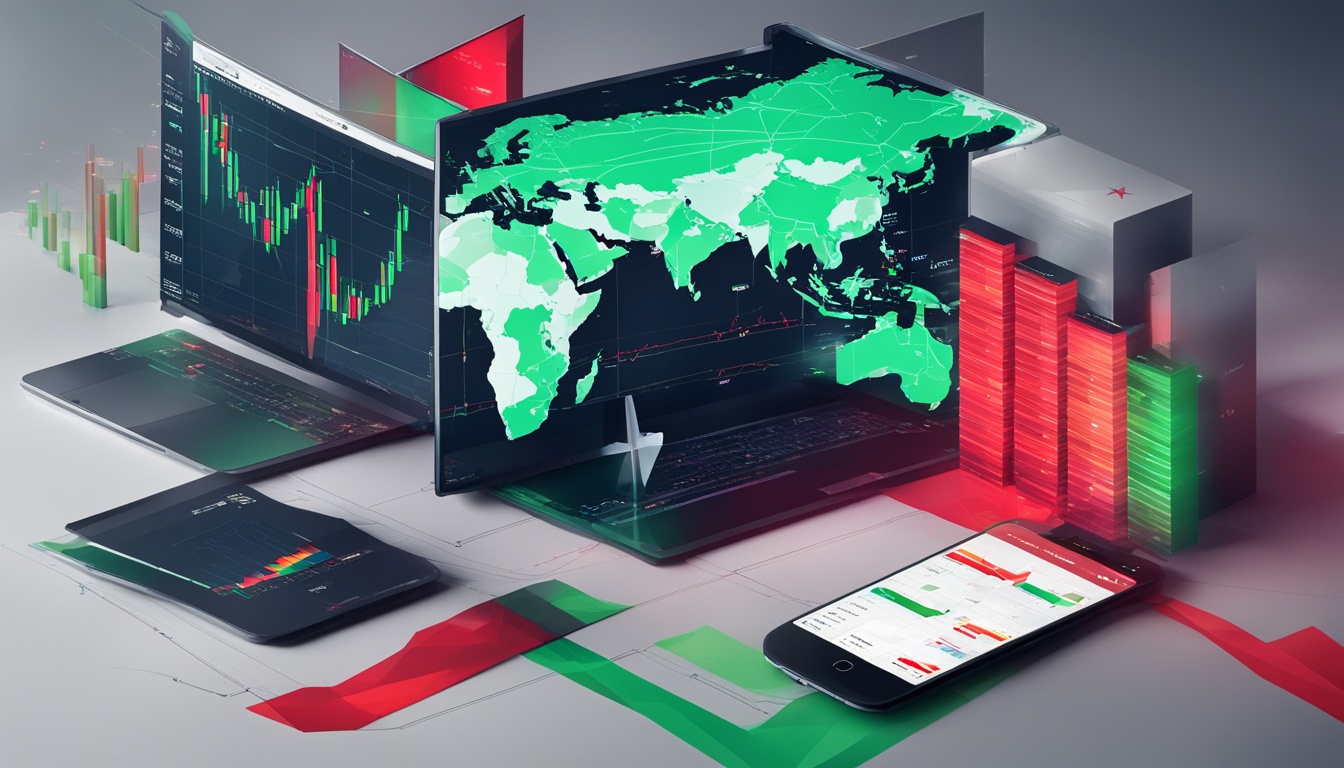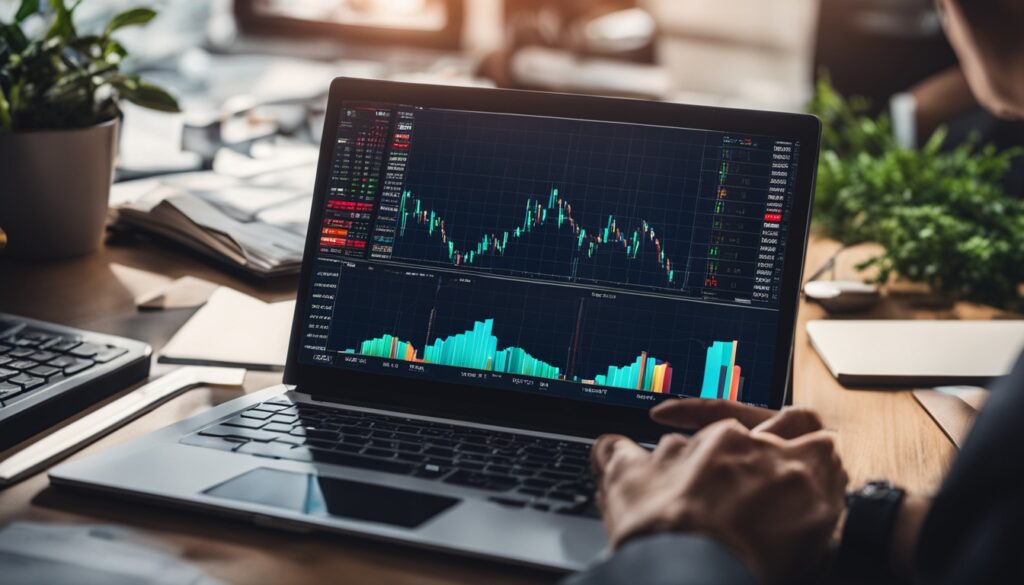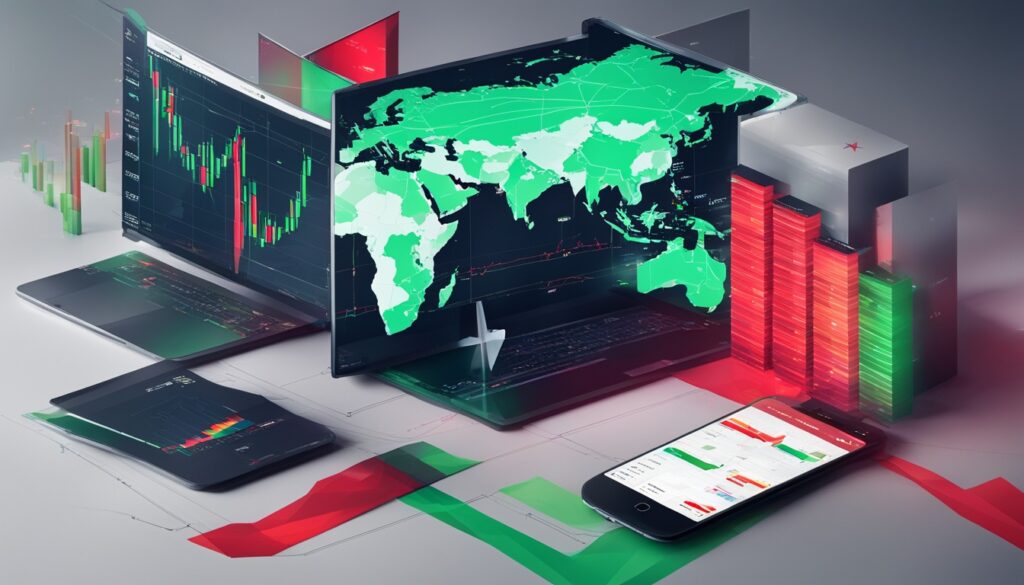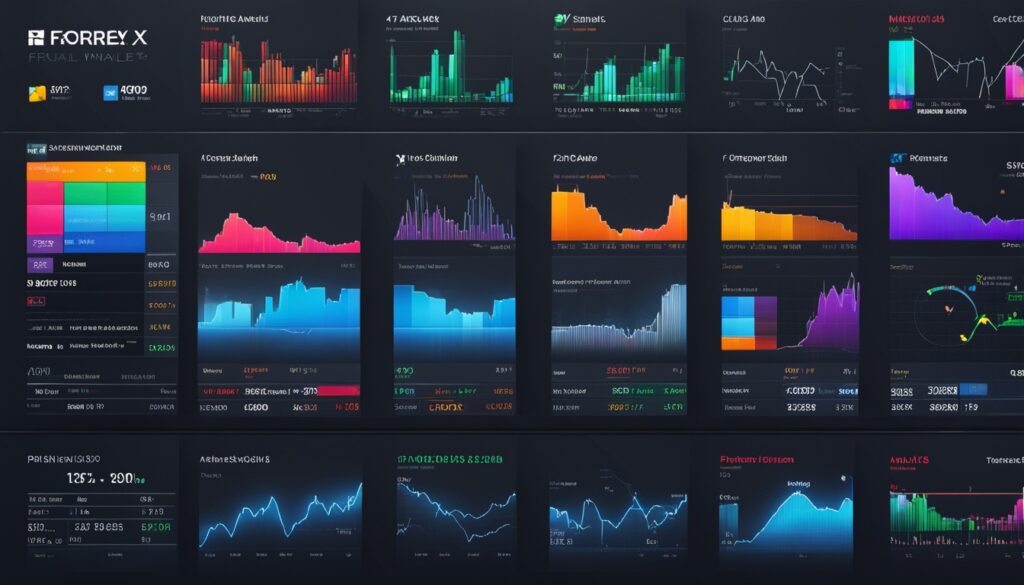
Did you know 95% of forex traders lose money? But, with the right tools like forex trading signals, you can change that. These are insights that tell you when to trade a currency pair. They are like a roadmap for making money.
Imagine a system that tells you when to buy or sell currency. That’s what forex signal systems do. They analyze charts, news, or both to give you a clear buy or sell signal. These systems could cost money, be free, or even made by the traders themselves. They aim to show the best moments to trade, giving traders a big advantage.
Forex signals are like tips that tell you what to do with your currency. They can come from looking at charts or recent events. Using these signals can make any trader better, from newbies to pros. With these insights, your trading can get a lot stronger.
### Key Takeaways
– Forex trading signals provide actionable insights to guide traders on when to enter and exit the market
– Signals can be generated through technical analysis, fundamental analysis, or automated algorithms
– Forex signals can help both expert and novice traders improve their trading performance
– Selecting a reliable broker and signal provider is crucial to avoid significant losses
Introduction
In the world of forex trading, signals are now vital. These forex trading signals give both new and skilled traders valuable advice. They help navigate the complex currency markets. If you want to boost your current strategies or find new chances, knowing about forex signals is crucial.
What is a Forex Trading Signal?
A forex trading signal tells traders when to buy or sell currency pairs. It’s like a helpful tip. It can come from looking at charts (technical analysis), studying the market (fundamental analysis), or using computer programs (automated algorithms).
These signals share important details like which currency pair to trade. They also list the points to enter and exit a trade, plus the levels to set for stopping losses and taking profits.
Why Use Forex Trading Signals?
Using forex trading signals can lift a trader’s game. They offer insights and guidance, no matter how much you’ve traded. They are handy for fine-tuning existing strategies, verifying your own research, or finding new opportunities.
Integrating forex signals into your strategy might boost your trading accuracy. It could also up your success chances in the currency market.

What are Forex Trading Signals and How Do They Work?
Forex trading signals are like smart suggestions for traders. They tell traders when to buy or sell currency pairs in the foreign exchange market. These suggestions can come from looking at the technical and fundamental parts of trading or be created by automated methods. They give important details. This includes what currency pair to trade, when to enter and exit, and levels to set for stopping losses or taking profits.
This info helps traders make their moves. But, how well signals work depends on the trader’s style, how they manage risks, and the current market. Even with good signals, making money is not certain. There’s always the chance of losing in trading.

Forex trading signals can be made from looking at charts and news or a mix of both. For instance, people might look at moving averages or special patterns on charts to decide. Creating a good method for looking at trading signs is key. This is especially true for making trading systems that run very fast, like high-frequency trading or HFT. These systems decide to trade in tiny fractions of a second.
These signals can start either manual or automatic trades. They can be sent through email, WhatsApp, or Skype. The top systems explain why a certain trade is suggested. They say this helps take out the emotions that could change a trader’s mind if it was done manually.
Types of Forex Trading Signals
In forex trading, signals come in different types. They vary by how they’re made and the details they offer. Knowing the kinds of signals available can guide traders in picking the right ones. This choice is based on trading plans and how much risk traders can handle.
Manual vs Automated Signals
Manual forex signals are crafted by experts. These experts mix technical tools with news on prices and market events. They offer deep insights and bigger chances for profit. Human brains are key in these signals.
On the flip side, automated systems rely on computer programs. These use historical data to find trading opportunities. They can be quicker in making moves. But, they might miss the human touch in making crucial decisions.
Paid vs Free Signals
There’s a mix of free and paid forex signals out there. You might find some for free, but others will cost you. For those you pay for, monthly fees can be anywhere from $40 to $500. The choice between the two comes down to what you can afford and how much help you want from the signal giver.
Entry vs Exit Signals
In forex, signals can help decide when to jump in or out of a trade. Entry signals tell you when to get into a trade. Exit signals help you know when to leave one. These use tools like candle patterns and market levels to spot good entry or exit points.
It’s important to select and use these signals carefully. Make sure they fit with how you manage risks and trade. This way, you can make the most of the signals and aim for success.

Copy Trading and Social Trading
Copy trading and social trading are new ways for forex traders to learn from others. With copy trading, traders can invest like successful experts. By copy past trades, they learn and earn more.
Social trading is about sharing and cooperating on trades. It lets traders talk about their strategies and learn from each other. This method connects traders worldwide, building communities and sharing knowledge.
Being active in sharing wins and strategies helps traders get noticed in these communities. The more active they are, the more they attract followers and potential income.
These methods offer a wide range of trading options. From currencies to cryptocurrencies, everyone can find something they like. This variety helps traders meet their goals and try new markets.
| Metric | Value |
|---|---|
| 1 in 3 individuals consider traditional stock market approaches as overly complex | Prefer to simplify the process by automatically following traders |
| 1 in 4 investors were contemplating social trading in the previous year | – |
| Social trading platforms are projected to grow to €40 billion by 2020 | Annual growth rate of 96% |
| Social trading platforms are projected to grow to €70 billion by 2025 | Annual growth rate of 48% |
| The global FX market is valued at $1,934,500,000,000 | Significantly surpassing the equities market by a ratio of 27:1 |
| The daily trading volume in the FX market is 53 times more substantial | Than that of the New York Stock Exchange |
| Over 85% of FX transactions focus solely on major currency pairs | EURUSD, USDJPY, GBPUSD, USDCAD, AUDUSD, NZDUSD, and USDCHF |
Today, copy trading and social trading are quite popular. They give traders a way to learn from the best and make more money. By following skilled traders and being active in the community, traders can boost their own success.
Others also read this article : Building a Diverse Investment Portfolio from Scratch

Forex Signal Providers
In forex trading, signal providers are key. They give traders useful insights. There are two types: manual and automated.
Manual Signal Providers
Forex signal providers who work manually are experts. They observe the currency markets closely. Based on their insights, they suggest trades with detailed information like entry and exit points.
These experts share their knowledge through online platforms or social media. Traders find their advice very helpful compared to solely relying on their strategies.
Automated Signal Providers
Automated signal providers use computer algorithms. These systems look at market data and technical indicators. Then, they pick potential trades without being influenced by emotions.
Algorithmic trading is quick and consistent. This means those providers can suggest a lot of trades. This could lead to spotting more profitable opportunities.
But, it’s crucial to check how reliable these automated providers are. The accuracy of their signals can vary. It depends on their algorithms and the current market conditions.
Both manual and automated forex signal providers help traders. They offer insights to deal with the challenges of the forex market. Choosing the right signal providers can improve a trader’s performance and their success chances.
How to Use Forex Trading Signals
Using forex trading signals right involves several important steps. Let’s look at what you need to do to use these tips well in your trading plan.
Choosing a Broker and Platform
First, pick a trusted broker and platform to get your forex signals. Find brokers known for fast, secure signal delivery. Also, make sure the platform you pick works well with your signal source. This makes monitoring and trading on the signals easier.
Evaluating Signal Providers
Take time to check out different signal providers before you use them. Look at their background, signal accuracy, and how they’ve done in the past. Read what other traders say about them to understand their reliability and signal quality. Knowing how they come up with signals, either through technical or fundamental analysis, is key too.
Testing Signals on a Demo Account
Don’t jump in with real money first. Test your provider’s signals on a demo account. This way, you can see how these signals perform without risking your money.
Use past data to see if the signals are effective and fit your trading style. Once you’re happy with these results, you can start live trading.
By doing these steps, you can fully benefit from forex trading signals. They can be a great help in your trading, but it’s up to you to use them wisely. Always make sure your trades match with your goals and risk handling.
Case Studies and Examples
Let’s look at some case studies and examples of forex trading signals in action. We’ll see how they work for different traders, whether they are just starting or have lots of experience.
Beginner Trader Using Free Signals
Jenny tried forex trading as a beginner. She used free signals to guide her trades. The signals showed her what to trade, when to enter and exit, and where to set stop-loss and take-profit levels.
With these signals, Jenny made her first trades successfully. Even though she didn’t make much money, she gained confidence. This approach also taught her how to use signals in her trading strategy as she learns more.
Technical Analysis Signal
Mark is an experienced trader who focuses on technical analysis. He creates his own trading signals by watching charts and technical indicators. But Mark also uses a paid service for extra analysis.
One day, this service gave Mark a signal about a trade in the EUR/USD pair. It suggested when to enter, where to set stop-loss, and when to take profit. Mark combined this with his analysis and made a profitable trade.
Fundamental Analysis Signal
Sarah is a trader who uses fundamental analysis. She pays close attention to economic news. She received a signal about trading the GBP/JPY pair because the Bank of England might raise interest rates.
After checking the signal with her own research, Sarah made the trade. She was able to profit from the change in price that followed the bank’s decision.
Automated Algorithm Signal
John created an automated trading algorithm. It looks for trading chances in the forex market. This algorithm uses both technical and quantitative data to generate signals.
John also uses a service for more signals, like the ones his algorithm produces. Adding these signals to his strategy helps John find more trading opportunities.
Profitability and Legality of Forex Signals
In forex trading, knowing if signals make money and are legal is key. Traders must grasp the risks and rewards of using signals. This helps make choices that fit their goals and how much risk they’re okay with.
Can You Be Profitable with Forex Signals?
Figuring out if forex signals bring profit is complicated. They could help, but not always. Forex signals don’t always win and could cause big losses, possibly all your money. To win with signals, traders must be good at reading and acting on them. Plus, they should know how to manage risks well.
Remember, making money with forex signals depends on your strategy, how you manage risk, and what the market’s like. Many experts use signals along with their own smarts. But, be careful and always question where the signals come from.
Are Forex Signals Legal?
If signals come from trustworthy and regulated places, their legality isn’t often an issue. But, be ready to spot check and watch over signals just like any trading move. It’s smart to test a signal system in a practice setting and check its past performance if you can. This makes sure the signals work well with how you trade.
Should You Pay for Forex Signals?
Deciding to pay for signals depends on your style and what you like. Some signal givers are free, others need money for their service, either in one payment or you pay monthly. Paid signals might give better info and service. But, it’s vital to check the provider well and make sure their signals are worth the cost.
In the end, the profit and legality of forex signals matter a lot for traders. Being smart and doing your homework on signal providers helps. This way, you can choose signals that line up with what you’re after and how much risk you want to take.
Conclusion
Forex trading signals are a powerful asset for traders, no matter their level of experience. They offer clear advice and insights for dealing with the foreign exchange markets. These signals come from looking at market data, understanding economic news, and using smart programs.
Using forex signals in your trading plan has many benefits. They save time by giving you quick, informed choices, which might improve how you trade. You also get a chance to understand market trends and trading methods better.
It’s crucial to pick the right signal providers by testing their signals on a practice account first. Look at how they send the signals, how often they’re right, the costs, and other details. This step helps ensure you benefit fully from their service.
While forex signals can boost your trading, they should never replace your own research and risk management. Learning about these signals and applying them smartly can open new doors for your trading success. They’re a good addition, but they’re not the key to everything in trading.





